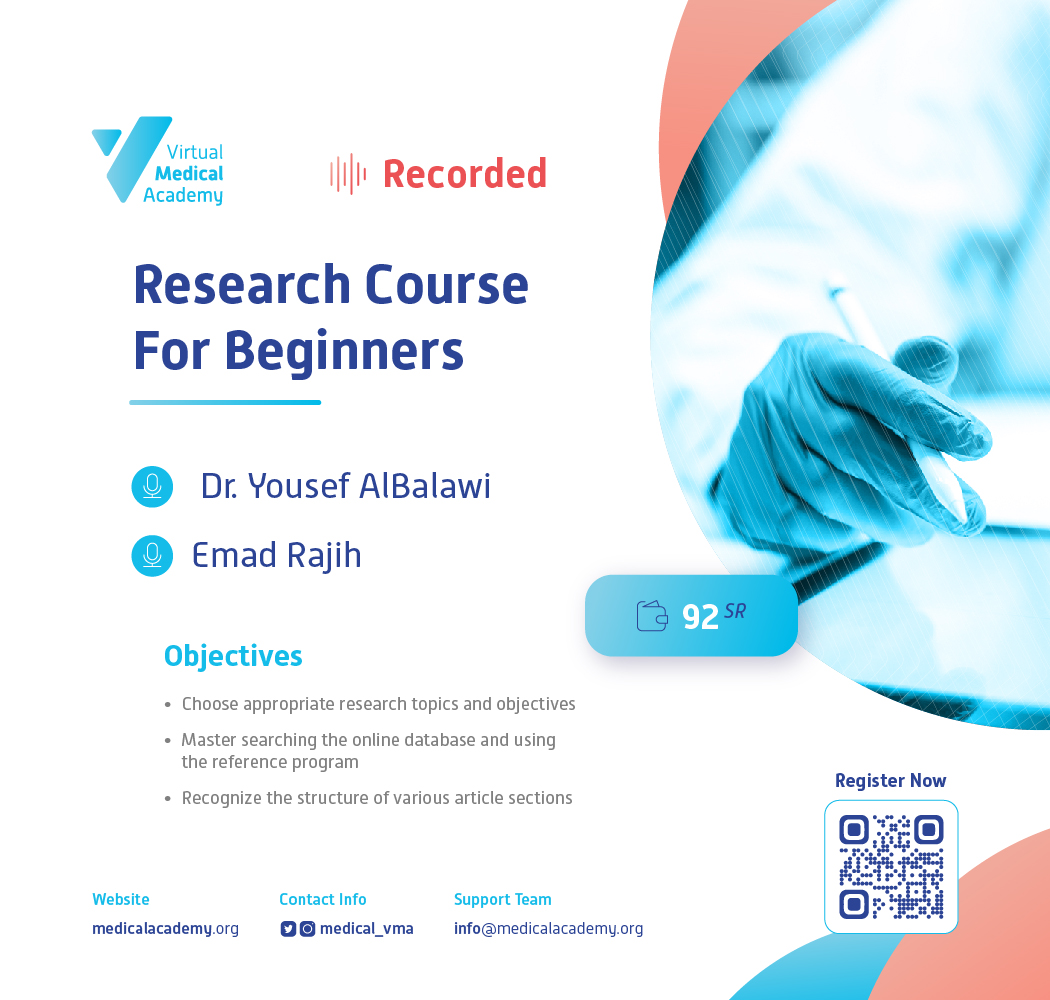Looking for an online research course for beginners in Saudi Arabia?
We’ve got your back!
We know that navigating through the complexities of research topics (medicine, dentistry ..), online databases, and article structures can be overwhelming.
That’s why we put together a comprehensive course that will make you not only conquer the basics but emerge as a research rockstar with the ability to choose impactful topics, navigate databases with ease, and understand the intricate dance of article sections.
Intended Learning Outcomes
By the end of the course, you will be able to:
1. Choose appropriate research topics and objectives
2. Master searching the online database and using the reference program
3. Recognize the structure of various article sections
Course Material
The Research course is comprised of 25 pre-recorded videos that cover all what you need to know to kick off your medical research journey.
For beginners diving into medical research, it’s crucial to grasp foundational concepts that form the backbone of the research process. Here are some essential topics that beginners should focus on:
- Introduction to Research: Understand the basic principles and objectives of medical research.
- Research Ethics: Learn about ethical considerations and guidelines in medical research involving human subjects.
- Research Types: Explore the distinctions between observational, experimental, and clinical research.
- Research Design: Gain insights into designing research studies, including cross-sectional, case-control, cohort studies, and randomized controlled trials (RCTs).
- Literature Review: Develop skills in conducting thorough literature reviews to understand existing research in a particular field.
- Hypothesis Formulation: Learn to create clear and testable hypotheses that guide the research process.
- Variables and Data Collection: Understand the concept of variables and methods for collecting and recording data.
- Sampling Techniques: Explore various sampling methods and their applications in medical research.
- Biostatistics Basics: Familiarize yourself with basic statistical concepts used in medical research, such as mean, median, standard deviation, and p-values.
- Data Analysis: Learn how to analyze research data using statistical tools and software.
- Interpreting Results: Develop skills to interpret research findings and draw meaningful conclusions.
- Writing Research Proposals: Understand the components and structure of a research proposal.
- Informed Consent: Comprehend the importance of obtaining informed consent from research participants.
- Publication Ethics: Learn about ethical considerations and authorship guidelines when publishing research.
- Critical Appraisal: Develop the ability to critically evaluate research articles, assessing their methodology, results, and conclusions.
- Peer Review Process: Understand the peer review process and its significance in validating research.
- Research Collaboration: Explore the benefits of collaborating with other researchers and institutions.
- Effective Communication: Enhance your skills in presenting and communicating research findings.
- Research Funding: Gain insights into seeking and obtaining funding for research projects.
- Emerging Trends in Medical Research: Stay updated on current trends, technologies, and advancements in the medical research field.
Remember, building a strong foundation in these topics will empower you to navigate the dynamic and challenging landscape of medical research effectively.
Continuous learning and staying abreast of advancements in the field are also essential for a successful research career.
Why should you learn medical research?
Learning medical research is essential for several reasons. Firstly, it empowers healthcare professionals to make informed decisions based on evidence, contributing to evidence-based practice (e.g. treating dental sensitivity).
This not only enhances patient care but also ensures that medical interventions are grounded in the best available scientific knowledge.
Moreover, understanding medical research fosters critical thinking skills. It teaches individuals to analyze information, question assumptions, and draw conclusions based on evidence—a crucial aspect of professional development in healthcare.
The ability to critically evaluate scientific literature enables healthcare professionals to stay updated on the latest advancements and make well-informed decisions about patient care.
Lastly, engagement in medical research allows individuals to actively contribute to the growth of medical knowledge.
By participating in research projects, individuals become part of a broader scientific community, addressing unanswered questions, challenging norms, and driving innovation in the field.
Whether for academic requirements, career advancement, or a desire to positively impact patient outcomes, learning medical research is a foundational step in the journey of healthcare professionals.
